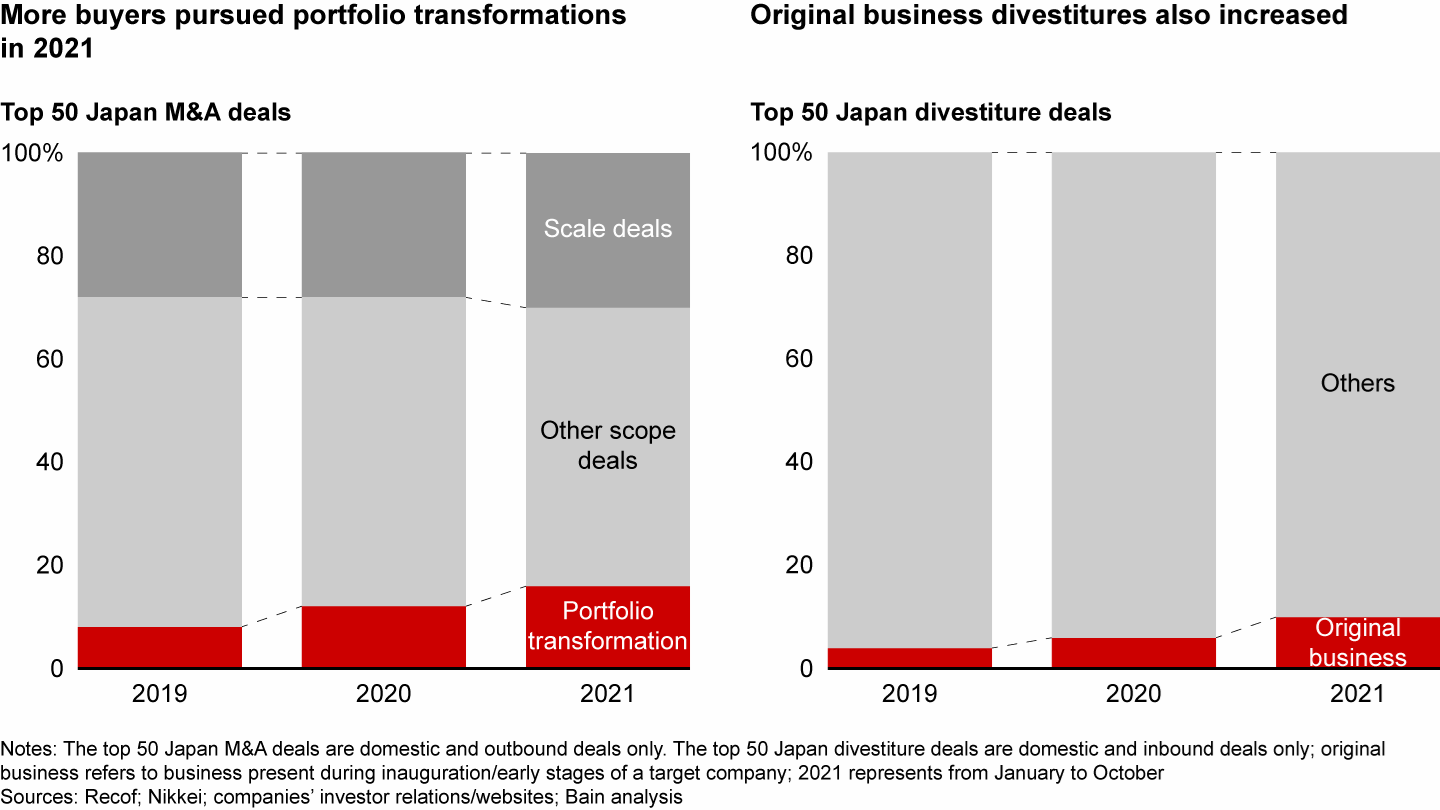M&A Report

At a Glance
- Among Japan’s 50 biggest deals of 2021, eight were outbound deals aimed at transforming the acquirer’s portfolio.
- At about the same rate, companies in Japan are selling original businesses that are not core to their future strategy. With their growing interest in Japan, private equity firms are eager buyers of divested assets.
- Transformative deals are challenging because they are both scope/capability as well as cross-border deals.
This article is part of Bain's 2022 M&A Report.
Japan is in the midst of a boom in outbound M&A. Deals for companies outside of the country have grown to represent as much as 40% of total deal value over the past five years. While many of these deals are aimed at expanding a company’s geographic reach or product offerings, a surprising number now reflect a different trend: transformative M&A.
After years of resisting the need to sell unrelated assets, Japanese companies are taking steps to reshape their portfolios.
Among Japan’s top 50 outbound deals in 2021, eight were intended to transform the portfolio of an acquirer (typically a conglomerate) to create a path to sustainable profit growth (see Figure 1). The pursuit of transformative M&A comes at a time of digitization, business model disruption, and sluggish domestic market growth for many companies’ “Engine 1” core business. Contributing to the transformative M&A trend, companies selling assets to fund the acquisitions have a ready buyer in private equity, which has expanded its interest in M&A in Japan.
Transformative M&A deals became more prevalent in Japan in 2021


To see examples of transformative deals, look no further than Hitachi’s $9.6 billion acquisition of GlobalLogic, a US-based digital solutions provider. It was Japan’s largest deal of 2021, and its purchase had significant implications for Hitachi’s portfolio. Hitachi bought GlobalLogic as a catalyst to accelerate the growth of its Lumada Internet of Things (IoT) solution by gaining access to the target company’s differentiated digital engineering capabilities.
Portfolio transformation also was the impetus behind the country’s second-largest outbound deal of 2021, Panasonic’s $7.1 billion purchase of Blue Yonder, a US-based digital supply chain management solutions provider. The deal is aimed at helping Panasonic hasten the shift from hardware to software in the supply chain management field.
Transformative M&A comes at a time of digitization, business model disruption, and sluggish domestic market growth for many companies’ core businesses.
Unlike typical scale M&A, these deals aren’t purely focused on generating short-term cost synergies. Also, they typically are bought at high deal multiples that make it difficult to justify only by EBITDA growth. Instead, buyers hope to grow their own EBITDA multiple by sending a clear message to the capital market that these acquisitions will help transform their business portfolio for the midterm to enable future sustainable growth.
Divestitures of original businesses
Business portfolio transformation cannot be a one-sided matter of adding new assets. It needs to be balanced by carve-outs or divestitures. While Japanese conglomerates have been eager to acquire, they have been slower to divest their original businesses, which sometimes represent a substantial portion of their revenue and are often viewed as sanctuary businesses.
Yet more companies are now making the decision to jettison businesses that are no longer in accord with their future strategy. After selling Hitachi Chemicals and other major assets, the Hitachi conglomerate announced selling Hitachi Metals, one of its original businesses, to a consortium led by Bain Capital for $7.5 billion in 2021. Hitachi Metals was viewed as a noncore asset as the parent company shifted its focus to IoT solutions as a key driver of growth. Another example is Japanese chemical conglomerate JSR selling its elastomer business to Eneos, a Japanese energy conglomerate. Divestitures of original businesses represented 10% of Japan’s 50 top deals in 2021.
More companies are now making the decision to jettison businesses that are no longer in accord with their future strategy.
What it takes to make transformative M&A successful for companies in Japan
Transformative deals can be more challenging because they are both scope/capability deals as well as cross-border deals. But buyers can boost the odds of success by focusing on three key areas:
- Devote more effort to developing a clear deal thesis. Because these are not typical scale deals aimed at generating cost synergies, it’s critical to build a clearly articulated strategic rationale and hypothesis for how the deal will deliver top-line synergies. That rationale needs to be clearly set as shared strategic guidelines among buyers as well as target companies.
- Protect the acquired company’s business momentum, culture, and talent. Too often, Japanese acquirers take the instinctive route of pulling target companies into their traditional corporate culture, and as a result, they destroy the unique culture that fostered the innovation and made the target so attractive. The better option often is to preserve the target’s standalone business momentum, culture, and talent—and subsequently to foster cross-polarization.
- Execute deals with a well-devised M&A strategy and sufficient M&A capabilities. Japanese companies have somewhat bitter experiences when it comes to cross-border deals. In our analysis, 20% of such deals end up with book value impairment while another 10% end up with withdrawals or are sold at lower values. An underlying reason is that Japanese companies tend to overpay—they usually pay 40% more than the global average. Winning companies have a clear M&A strategy and deal playbook with rigorous capabilities for screening targets, performing disciplined diligence, and integrating where it matters. They learn from each deal, honing their capabilities for repeatable success.